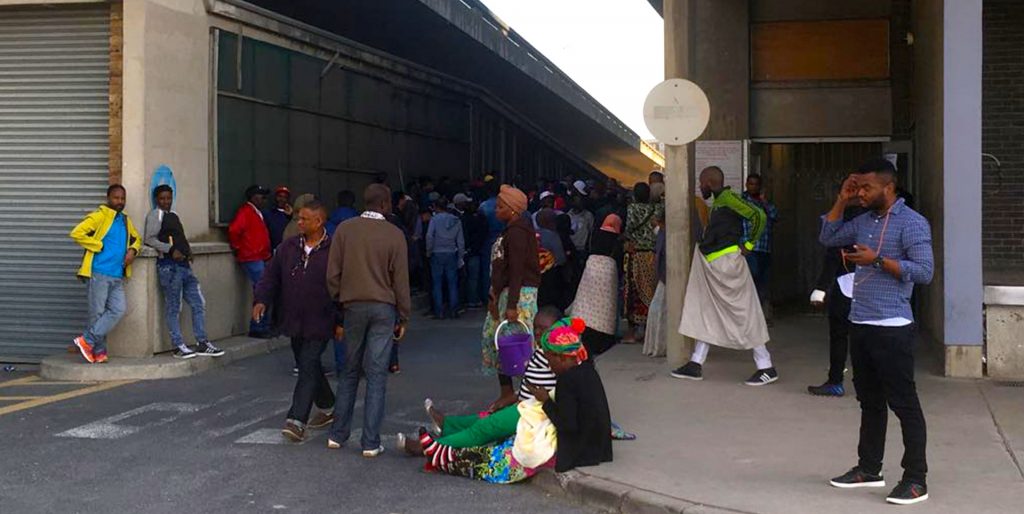This World Refugee Day the South African government must ensure a safe, fair and efficient asylum management process and create a country that welcomes all those in search of refugee.
People move from their home countries for a many reasons; some by choice in hopes of new opportunities, others are forced to abandon their lives and loved ones because they are fleeing war and conflict or persecution simply because of who they are or what they do.
South Africa has a strong legal and human rights framework for refugees and asylum seekers’ rights. However, the failed asylum management process has been well documented over the years, and shows that the implementation of existing laws and policies is starkly lacking.
For asylum seekers who have made the long to journey to South Africa, fleeing persecution, war and conflict, in search of peace and stability, their arduous journey doesn’t end on arrival in the country.
Amnesty International South Africa embarked on research in 2018 to gather data on the experiences of asylum seekers attempting to exercise their rights to get and remain documented in South Africa. What we found is an asylum management system that is failing rights-holders.
The refugee status determination process should be relatively simple. According to the Refugees Act asylum seekers are required to report a Refugee Reception Office (RRO), within five days of their arrival in South Africa, to start the refugee status determination process. These offices are located in Musina, Pretoria, Durban and Port Elizabeth (only reopened in October 2018 following long court proceedings), They are required to be given an asylum seeker permit which they need to renew and keep valid until their status is determined. The whole process of adjudication take up to 180 days (6 months), but system failures have left approximately 190,000 asylum seekers living in limbo for up to 19 years.
The closure of of the urban RROs in Johannesburg, Cape Town and Port Elizabeth in 2011 and 2012, combined with poor decision-making – including – has resulted in a backlog of approximately 190,000 claims. Institutional xenophobia and anti-migrant bias are rife, exacerbating the vulnerable position of people attempting to get refugee status.
While asylum seekers are allowed to enter the country, and have the , study and access basic education and health care, their reality is quite different. Remaining documented is tremendously expensive and time-consuming to asylum seekers who often have to travel long distances to get to RRO, which may be 900km to 1,900kms away. And once they arrive there’s no certainty that they will be helped that day, sometimes having to return three or four times.
Even if they gain access to the RRO, documentation in not a given. In some instances they are turned away and given an appointment slip showing the date they should return. This effectively leaves asylum seekers ‘undocumented’ and vulnerable to harassment, detention and deportation.
Amnesty found that the asylum process is not explained properly to asylum seekers when they arrive, and translation is either lacking or of poor quality. Many asylum seekers who have recently fled their countries of origin and are unable to speak or understand English, which puts them at a major disadvantage in claiming refugee status without prejudice. This is compounded by the fact that most asylum seekers cannot afford to have legal representation to assist them with their claims if they are rejected.
The effects of the flawed asylum management system are multi-layered, including financial, physical and psychosocial. Some asylum seekers may have to travel very long distances regularly – every one- to six months – to renew their asylum seeker permits to stay documented. This affects their ability to get decent and permanent work and makes them vulnerable to unscrupulous business-people, which lands them in precarious work. The inability to remain documented hinders their rights to basic education and healthcare, and makes them vulnerable to harassment, arrest and detention.
In addition, asylum seekers are vulnerable to xenophobic violence. There have been many xenophobic incidents over the years; in May 2008, a series of attacks across the country left 62 people dead. Xenowatch, which monitors xenophobic violence in South Africa, reported 33 incidents between January and 25 September 2018.
We have found that xenophobic attacks are often preceded by xenophobic utterances by political and cultural leaders. The words and actions of our leaders matter. It is time for them to stop promoting divisive political narratives and start uniting people around shared values that builds a more inclusive South Africa.
The South Africa government, in particular the Department of Home Affairs must ensure a safe, fair and efficient asylum management process and create a country that welcomes those in search of a place to call home. They should comply with the Supreme Court of Appeal order to re-open the Cape Town RRO, and effectively resource all RROs, and ensure that the refugee status determination process is administratively and procedurally just and fair.
If rights protection is not put at the centre of the asylum system it will continue to result in violations of asylum seekers’ rights, undermining the intentions of the Refugees Act as well as the South African Constitution which protects the rights of every individual in the country.


